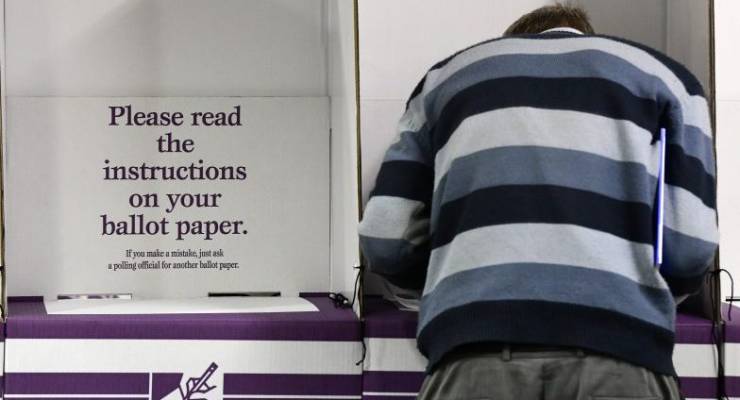
A Northern Territory byelection has unexpectedly emerged as a flashpoint in the battle for the soul of progressive Australian politics.
Voters in the northern Darwin seat of Johnston are going to the polls on February 29, after the resignation of renegade Labor MP Ken Vowles, and the Greens’ have recommended that voters put Labor last. Labor’s candidate is Joel Bowden, a former AFL player and union leader.
Voters who heed the Greens’ advice will be putting Labor behind both the Country Liberal Party opposition, noted for its hard line on locally significant issues of law and order, and the Territory Alliance, a CLP breakaway party, whose candidates for the next territory election include one who ran for the messianic Rise Up Australia party at last year’s federal election.
The move has been prompted by the Labor government’s decision to lift the moratorium on natural gas fracking it introduced shortly after coming to power in 2016.
While there have been many past occasions when the Greens have registered displeasure with Labor by declining to make a recommendation one way or the other, it’s almost without precedent for them to actively tilt the scales in the conservatives’ favour.

The decision presents a useful line of attack for Labor at a time when revelations of an active pro-coal ginger group in its midst threatens to bite into what remains of its share of the environmental vote.
In their defence, the NT Greens point to the low stakes of this particular byelection, whose winner will serve for less than six months before a general election to be held on August 22.
As the Greens see it, this justifies framing the byelection as a chance to send a message to a government that’s grown complacent about environmental issues in a jurisdiction where the Greens stand little chance of securing parliamentary representation of their own.
It should also be noted that Greens voters are notoriously independent of mind when it comes to allocating their preferences. It’s a point of pride for the party in some ways, albeit one that weakens its hand in preference negotiations.
Labor typically receives about 80% of Greens preferences when they are directed their way, which reduces only to around 75% when no recommendation is offered.
Putting Labor behind the Coalition is the only preference strategy that can really make Labor sit up and take notice — and in all the party’s history, the Greens have only felt emboldened to do so on one previous occasion.
That was in the seat of Springwood at the Queensland state election of July 1995, when they sought to punish the Labor government of the day for planning a motorway through a koala habitat on Brisbane’s southern fringe.
While Greens preferences weren’t the decisive factor, the Liberals did gain the seat from Labor. Labor emerged from the election with a one-seat majority which was then lost, along with government, after a byelection defeat the following February.
On this occasion, the Greens can plausibly claim that the stakes aren’t nearly so high.
Even after Ken Vowles’ resignation and the loss of two other members to the crossbench, Labor remains overwhelmingly dominant in a parliament in which the opposition Country Liberal Party (CLP) has held just two seats since its devastating defeat in 2016.
Nonetheless, it is within the bounds of possibility that the Greens’ move will do more damage than intended to Michael Gunner’s Labor government. The government has had a rough four years in office and is far from assured of re-election in August, despite its current large majority.
The territory’s tiny electorates encompass only around 5000 voters (one 10th as many as a state seat in New South Wales or Victoria)-resulting in very substantial advantages for sitting members.
Should the CLP go into the election with such an advantage in a normally Labor-held seat like Johnston, it will be that much easier for it to carve out a path to victory in a compact parliament of 25 seats.








It just feels like another moment of the left eating the left. Better to have the morale high ground than actual control of the Parliament.
With the greens its once again the lunatics in charge of the asylum, whenever the greens start to look electable for the mainstream voter the lunatic fringe takes over and steers the car straight over the cliff.
What’s lunatic about being against fracking, braddybear?
Braddy, if any branch of Labor is stupid enough to allow any new fracking then they will deserve the electoral opprobrium that will follow.
No fracking anywhere, it has been a dangerous failure in Queensland and is way too mrisky and expensive to try anywhere else,
It’s high time we changd the rules on preferences, preference deals, and how to vote cards.
How about we just stop parties and candidates from telling voters who they should preference? You can have a how to vote card that shows how to put a 1 against that party’s candidate, and then tells people to number either all the other squares from 2 to X (where X is the number of candidates), or however many squares that jurisdiction requires to be filled in for a valid ballot. Combine this with a Robson rotation of ballot papers to remove the donkey vote this may or may not increase and this particular little problem is sorted once and for all.